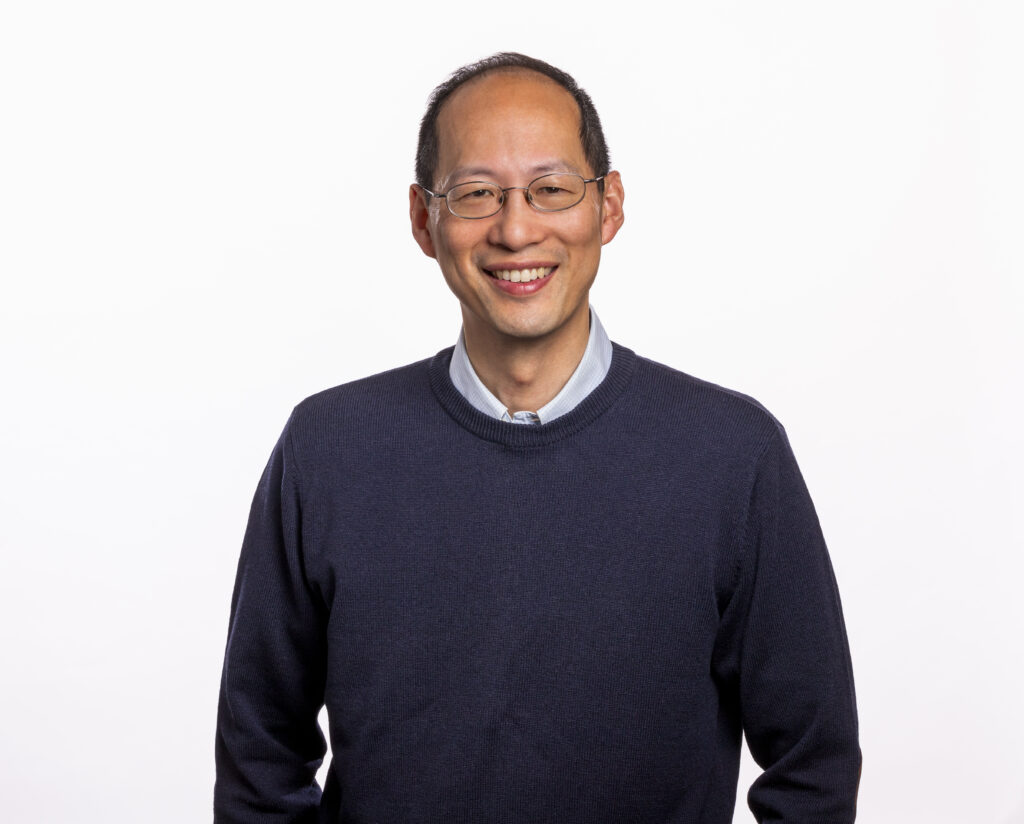Christopher Chang Joins Princeton Chemistry
The Department of Chemistry is pleased to welcome Christopher Chang as the Edward and Virginia Taylor Professor of Bioorganic Chemistry, effective July 1, 2024.
Chang, who comes to Princeton from the University of California, Berkeley, studies how metals on the periodic table impact energy science, sustainability, and our own biology. He seeks to advance concepts in sensing and catalysis by fusing approaches in chemistry, biology, and medicine.
Among other accolades, Chang won a 2021 Guggenheim Fellowship for developing activity-based sensing as a general technology platform for biological applications like diagnostics, proteomics, and drug discovery.

Princeton Chemistry’s new Edward and Virginia Taylor Professor of Bioorganic Chemistry, Christopher Chang.
“Princeton is well poised to take advantage of the fact that chemistry is central to many of the important challenges we face in the world today,” said Chang, who is currently holds the Class of 1942 Chair in Berkeley’s Department of Chemistry with a joint professorship in the Department of Molecular and Cell Biology and the Helen Wills Neuroscience Institute.
“Opportunities abound for chemists everywhere across campus. For example, neuroscience is so proximal to chemistry, and the interest in sustainability here is something that resonates with me. And the Ludwig Princeton Branch aligns with our work in diagnosing, deciphering, and treating the progression of cancer, specifically metastasis. Overall, Princeton provides a unique intersection of areas that benefit society where chemistry is really the hub of it all.”
The appointment was approved by Princeton’s Board of Trustees this weekend. Also newly hired by the Department is Michelle Chang, professor of chemistry and of chemical and biomolecular engineering at Berkeley, who is married to Chris Chang.
“The successful recruitment of Michelle and Chris represents a huge coup for our department,” said Thomas Muir, the Van Zandt Williams Jr. Class of 1965 Professor of Chemistry. “Bringing these world class scientists, both of whom are at the top of their game, to Princeton truly moves the needle for us.
“In addition to being movers and shakers in their respective fields,” Muir added, “Michelle and Chris are really wonderful people and will bring many leadership qualities to Frick, strengthening the entire enterprise here.”
Chang landed in the field of chemistry after what he describes as a fairly circuitous route. He had originally planned on majoring in engineering as an undergraduate at the California Institute of Technology. But he loved the laboratory work with the beautiful colors of inorganic Werner compounds and the idea of “making new things,” he said, and this motivated him to circle back to chemistry.
Chang Lab Research
Today, the mission of Chang’s lab reflects his own ranging curiosity. He combines research in areas as disparate as consciousness and behavior, aging, cancer metastasis, and energy science.
The lab studies the chemistry of biology and energy, advancing new concepts in imaging, proteomics, drug discovery, and catalysis, drawing from core disciplines of inorganic, organic, and biological chemistry. Researchers in his lab have developed activity-based sensing as a general platform to identify transition metals, reactive oxygen species, and one-carbon units as new classes of single-atom signals for allosteric regulation of protein function to decipher the proteome code.
These chemical tools also reveal unique metal and redox disease vulnerabilities as targets for innovative drug discovery efforts to treat neurodegeneration, cancer, and metabolic disorders.
The lab’s work in artificial photosynthesis addresses global challenges in climate change. They use design concepts from biology to develop molecular electrocatalysts for carbon dioxide capture and conversion and nitrogen/phosphorus cycling.
Chang will bring a number of his graduate students and postdocs to Princeton Chemistry and will also participate in the spring graduate student recruitment season.
Chang grew up in Ames, Iowa but was raised in Indiana: “I literally grew up behind a farm in a place so small my home didn’t even have a street address. It was, Chang Family, Rural Route 6.”
He earned his undergraduate and his master’s degrees in chemistry at Caltech in 1997 after working under Harry Gray. Interestingly, one of Chang’s teaching assistants was Paul Chirik, now Princeton’s Edwards S. Sanford Professor of Chemistry and chemistry’s Department Chair.
Named a Fulbright Fellow during his senior year, Chang elected to go Strasbourg, France, because it gave him “a chance to see the world.” At Université Louis Pasteur, he worked under Jean-Pierre Sauvage (who won the Nobel Prize in chemistry in 2016). Chang earned his 2002 Ph.D. in chemistry from the Massachusetts Institute of Technology under the advisership of Daniel Nocera. He also did his postdoctoral work at MIT under Stephen Lippard as a Jane Coffin Childs Fellow.
Chang began his independent research career at Berkeley in 2004, rising to full professor in 2012.
In addition to the Guggenheim, his numerous awards include the Humboldt Research Award in 2020, a Blavatnik National Award in Chemistry in 2015, and the ACS Nobel Laureate Signature Award in Graduate Education in 2013. He was named a member of the American Academy of Arts and Sciences in 2017. Most recently Chang won the 2024 ACS Alfred Bader Award in Bioinorganic or Bioorganic Chemistry.
Chang was recently named editor-in-chief of the journal Accounts of Chemical Research. He has previously served as a founding senior editor and then deputy editor of ACS Central Science. He is a faculty scientist at Lawrence Berkeley National Laboratory, and an adjunct professor at University of California, San Francisco.
He and Michelle have a daughter, Emmeline, and will reside in Princeton.
